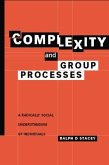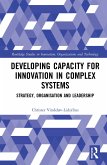Ralph Stacey (UK University of Hertfordshire)
Complex Responsive Processes in Organizations
Learning and Knowledge Creation
Ralph Stacey (UK University of Hertfordshire)
Complex Responsive Processes in Organizations
Learning and Knowledge Creation
- Broschiertes Buch
- Merkliste
- Auf die Merkliste
- Bewerten Bewerten
- Teilen
- Produkt teilen
- Produkterinnerung
- Produkterinnerung
Stacey's work examines how the 'knowledge economy' can be seen in a new light when considered from a complexity perspective. It stresses the importance of relationships as a source of, and influence on, information and knowledge creation.
Andere Kunden interessierten sich auch für
![Complexity and Innovation in Organizations Complexity and Innovation in Organizations]() Jose FonsecaComplexity and Innovation in Organizations77,99 €
Jose FonsecaComplexity and Innovation in Organizations77,99 €![Experiencing Spontaneity, Risk & Improvisation in Organizational Life Experiencing Spontaneity, Risk & Improvisation in Organizational Life]() Patricia Shaw / Ralph Stacey (eds.)Experiencing Spontaneity, Risk & Improvisation in Organizational Life65,99 €
Patricia Shaw / Ralph Stacey (eds.)Experiencing Spontaneity, Risk & Improvisation in Organizational Life65,99 €![Complexity and Group Processes Complexity and Group Processes]() Ralph D. StaceyComplexity and Group Processes62,99 €
Ralph D. StaceyComplexity and Group Processes62,99 €![Occupy Management Occupy Management]() Monika Kostera (Poland University of Warsaw)Occupy Management59,99 €
Monika Kostera (Poland University of Warsaw)Occupy Management59,99 €![The Paradox of Control in Organizations The Paradox of Control in Organizations]() Philip Streatfield (Supply Chain Director at Entertainment UK)The Paradox of Control in Organizations66,99 €
Philip Streatfield (Supply Chain Director at Entertainment UK)The Paradox of Control in Organizations66,99 €![Developing Capacity for Innovation in Complex Systems Developing Capacity for Innovation in Complex Systems]() Christer Vindelà v-Lidzelius (Kaospilot)Developing Capacity for Innovation in Complex Systems167,99 €
Christer Vindelà v-Lidzelius (Kaospilot)Developing Capacity for Innovation in Complex Systems167,99 €![Qualitative Management Research in Context Qualitative Management Research in Context]() Qualitative Management Research in Context64,99 €
Qualitative Management Research in Context64,99 €-
-
-
Stacey's work examines how the 'knowledge economy' can be seen in a new light when considered from a complexity perspective. It stresses the importance of relationships as a source of, and influence on, information and knowledge creation.
Produktdetails
- Produktdetails
- Complexity and Emergence in Organizations
- Verlag: Taylor & Francis Ltd
- Seitenzahl: 272
- Erscheinungstermin: 15. Februar 2001
- Englisch
- Abmessung: 234mm x 156mm x 15mm
- Gewicht: 418g
- ISBN-13: 9780415249195
- ISBN-10: 0415249198
- Artikelnr.: 21171019
- Herstellerkennzeichnung
- Libri GmbH
- Europaallee 1
- 36244 Bad Hersfeld
- gpsr@libri.de
- Complexity and Emergence in Organizations
- Verlag: Taylor & Francis Ltd
- Seitenzahl: 272
- Erscheinungstermin: 15. Februar 2001
- Englisch
- Abmessung: 234mm x 156mm x 15mm
- Gewicht: 418g
- ISBN-13: 9780415249195
- ISBN-10: 0415249198
- Artikelnr.: 21171019
- Herstellerkennzeichnung
- Libri GmbH
- Europaallee 1
- 36244 Bad Hersfeld
- gpsr@libri.de
Ralph Stacey is Professor of Management and Director of the Complexity and Management Centre at the University of Hertfordshire, and a member of the Institute of Group Analysis. He is also consultant to managers at many levels accross a range of organizations and the author of a number of books and articles on strategy and complexity theory in management.
List of illustrations, Series preface, Acknowledgements, 1. Introduction:
can learning and knowledge creation in organizations really be managed?,
Part I. The foundations of mainstream views on learning and knowledge
creation in organizations: systems thinking, 2. Mainstream thinking about
learning and knowledge creation in organizations, 3. Different levels of
learning and knowledge creation in organizations: the individual and the
social, Part II. Toward a complexity perspective: the emergence of
knowledge in complex responsive processes of relating, 4. The emergence of
the individual and the social in communicative interaction, 5.
Communicative action in the medium of symbols, 6. The organization of
communicative action: rule-based or self-organizing knowledge?, 7. The
emergence of enabling constraints: power relations and unconscious
processes, 8. Organization as communicating in the living present: how
knowledge emerges in complex responsive processes of relating, Part III.
Systems thinking and the perspective of complex responsive processes:
comparisons and implications, 9. Comparing systems thinking and the
perspective of complex responsive processes, 10. The organizational
implications of complex responsive processes of knowledge creation,
Appendix: Autopoiesis: an inappropriate analogy for human action,
Bibliography, Index
can learning and knowledge creation in organizations really be managed?,
Part I. The foundations of mainstream views on learning and knowledge
creation in organizations: systems thinking, 2. Mainstream thinking about
learning and knowledge creation in organizations, 3. Different levels of
learning and knowledge creation in organizations: the individual and the
social, Part II. Toward a complexity perspective: the emergence of
knowledge in complex responsive processes of relating, 4. The emergence of
the individual and the social in communicative interaction, 5.
Communicative action in the medium of symbols, 6. The organization of
communicative action: rule-based or self-organizing knowledge?, 7. The
emergence of enabling constraints: power relations and unconscious
processes, 8. Organization as communicating in the living present: how
knowledge emerges in complex responsive processes of relating, Part III.
Systems thinking and the perspective of complex responsive processes:
comparisons and implications, 9. Comparing systems thinking and the
perspective of complex responsive processes, 10. The organizational
implications of complex responsive processes of knowledge creation,
Appendix: Autopoiesis: an inappropriate analogy for human action,
Bibliography, Index
List of illustrations, Series preface, Acknowledgements, 1. Introduction:
can learning and knowledge creation in organizations really be managed?,
Part I. The foundations of mainstream views on learning and knowledge
creation in organizations: systems thinking, 2. Mainstream thinking about
learning and knowledge creation in organizations, 3. Different levels of
learning and knowledge creation in organizations: the individual and the
social, Part II. Toward a complexity perspective: the emergence of
knowledge in complex responsive processes of relating, 4. The emergence of
the individual and the social in communicative interaction, 5.
Communicative action in the medium of symbols, 6. The organization of
communicative action: rule-based or self-organizing knowledge?, 7. The
emergence of enabling constraints: power relations and unconscious
processes, 8. Organization as communicating in the living present: how
knowledge emerges in complex responsive processes of relating, Part III.
Systems thinking and the perspective of complex responsive processes:
comparisons and implications, 9. Comparing systems thinking and the
perspective of complex responsive processes, 10. The organizational
implications of complex responsive processes of knowledge creation,
Appendix: Autopoiesis: an inappropriate analogy for human action,
Bibliography, Index
can learning and knowledge creation in organizations really be managed?,
Part I. The foundations of mainstream views on learning and knowledge
creation in organizations: systems thinking, 2. Mainstream thinking about
learning and knowledge creation in organizations, 3. Different levels of
learning and knowledge creation in organizations: the individual and the
social, Part II. Toward a complexity perspective: the emergence of
knowledge in complex responsive processes of relating, 4. The emergence of
the individual and the social in communicative interaction, 5.
Communicative action in the medium of symbols, 6. The organization of
communicative action: rule-based or self-organizing knowledge?, 7. The
emergence of enabling constraints: power relations and unconscious
processes, 8. Organization as communicating in the living present: how
knowledge emerges in complex responsive processes of relating, Part III.
Systems thinking and the perspective of complex responsive processes:
comparisons and implications, 9. Comparing systems thinking and the
perspective of complex responsive processes, 10. The organizational
implications of complex responsive processes of knowledge creation,
Appendix: Autopoiesis: an inappropriate analogy for human action,
Bibliography, Index









